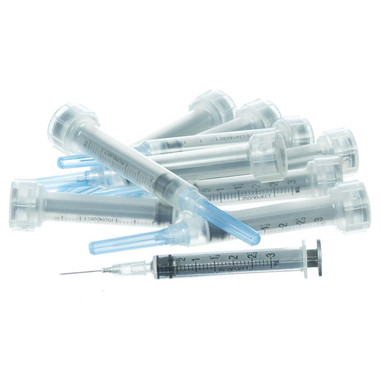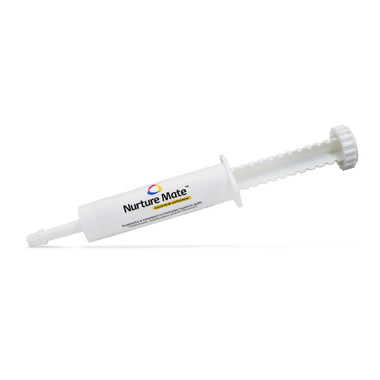Everything You Need to Know About Melatonin for Cats
Estimated 0 min read
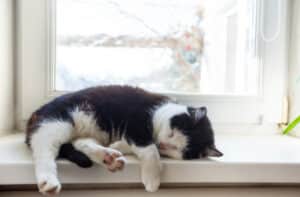
Cat sleeping at window
Melatonin for cats has gained attention as a potential aid for various feline health concerns, from sleep disorders to stress management.
This naturally occurring hormone offers intriguing possibilities for cat owners seeking to address certain behavioral and physiological issues in their pets.
However, as with any supplement, it’s crucial to understand the facts before considering its use.
In this comprehensive guide, we’ll empower you to discuss this option with your veterinarian and make informed decisions about your cat’s care.
Facts About Melatonin for Cats
- Melatonin is a hormone that regulates sleep-wake cycles in cats and may help with sleep disorders, stress, and certain types of hair loss
- While generally considered safe, melatonin can have side effects and should only be used under veterinary guidance, especially for breeding cats
- Proper dosage and administration of melatonin vary depending on the cat’s condition, with options including oral supplements and subcutaneous implants
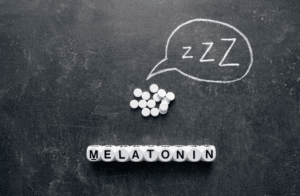 What is melatonin and how does it work in cats?
What is melatonin and how does it work in cats?
Melatonin is a hormone produced naturally by the pineal gland, a small endocrine gland located near the brain.
The secretion of melatonin in cats is primarily controlled by the presence or absence of light. When darkness falls, the pineal gland begins to release melatonin into the bloodstream, signaling to the body that it’s time to sleep. This helps regulate a cat’s sleep-wake cycle, ensuring they feel alert during daylight hours and sleepy when it’s dark.
Melatonin also plays a vital role in synchronizing various feline bodily functions with the external environment. For instance, melatonin levels can influence a cat’s body temperature, blood pressure, and even certain aspects of their immune system function. This helps cats maintain a balanced internal state that aligns with the natural day-night cycle.
In addition to its effects on sleep and circadian rhythms, melatonin has a profound impact on other hormonal processes in cats. It interacts with the endocrine system, influencing the production and release of other hormones. One notable example is its effect on reproductive hormones in cats. Melatonin can suppress the release of hormones that trigger estrus (heat) cycles in female cats, which is why it’s sometimes used to help control breeding in felines.
Melatonin also plays a role in regulating a cat’s stress response. By promoting a sense of calm and relaxation, it can help mitigate the effects of stress on a cat’s body and behavior. This calming effect is one reason why melatonin supplements are sometimes used to address anxiety-related issues in cats.
The hormone’s influence extends to other bodily functions as well. Some research suggests that melatonin may have antioxidant properties, potentially offering protective effects against cellular damage.
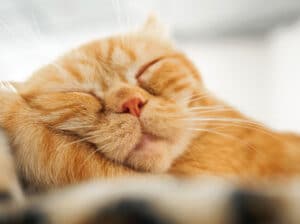
Cat with sleep disorder can benefit from melatonin
Benefits of Melatonin
One of the primary benefits of melatonin in cats is its ability to assist in the management of sleep disorders. Cats, like humans, can experience disruptions in their sleep-wake cycles, particularly as they age. Melatonin supplementation can help regulate these cycles, potentially improving the quality and duration of sleep for cats.
Beyond sleep regulation, melatonin’s natural calming effect can be beneficial for cats experiencing anxiety or stress-related behaviors. For instance, cats that exhibit excessive vocalization, restlessness, or agitation during nighttime hours may find relief through melatonin supplementation.
Managing Stress
Stress management is another area where melatonin may offer benefits to cats. Felines can experience stress from various sources, including changes in their environment, introduction of new pets, or even routine events like vet visits. By promoting a state of relaxation, melatonin may help mitigate the physiological and behavioral manifestations of stress in cats.
In the realm of feline reproduction, melatonin plays a crucial role in regulating heat cycles in breeding cats. Female cats typically experience estrus cycles influenced by the length of daylight. Melatonin supplementation can be used to manipulate these cycles, potentially suppressing heat in cats when breeding is not desired. This application can be particularly useful for cat breeders looking to control reproduction timing or for pet owners wanting to manage the behavior of unspayed females.

Cat losing hair
Hair Loss in Cats
Interestingly, melatonin has also shown potential in addressing certain types of hair loss (alopecia) in cats. While more commonly studied in dogs, there is some evidence to suggest that melatonin may help with feline hair growth disorders, particularly those related to seasonal changes or hormonal imbalances.
It’s important to note that while these potential benefits are promising, the use of melatonin in cats should always be approached with caution. The effectiveness of melatonin can vary depending on the individual cat and the specific condition being addressed.
Is melatonin safe for cats?
While melatonin is generally considered safe for cats, it’s crucial to understand the potential side effects and safety considerations associated with its use. As with any supplement or medication, melatonin can cause adverse reactions in some cats, and its effects can vary depending on the individual animal’s health status and other factors.
Side effects of melatonin
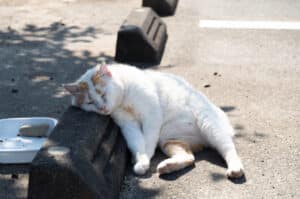
Drowsy Cat
The most common side effect of melatonin in cats is sedation or drowsiness. This is often an intended effect when using melatonin for sleep disorders or anxiety, but it’s important to monitor your cat’s responsiveness and energy levels after administration. Some cats may experience changes in appetite, either an increase or decrease, which should be closely observed. In rare cases, cats might exhibit gastrointestinal upset, such as vomiting or diarrhea, after taking melatonin.
Potential drug interactions are an important consideration when using melatonin. While research on drug interactions specific to cats is limited, caution is advised when combining melatonin with certain medications. Benzodiazepines may have an enhanced sedative effect when used alongside melatonin. Cats with diabetes or those on medications that affect blood glucose should be monitored carefully when taking melatonin.
For breeding cats, special precautions must be taken when using melatonin. While melatonin can be beneficial in regulating heat cycles, it can also disrupt fertility and affect pregnancy. In male cats used for breeding, melatonin could potentially impact sperm production.
There are certain situations where melatonin should be avoided altogether. Cats with known allergies or sensitivities to melatonin should not be given the supplement. Caution is also advised for cats with liver or kidney disease. Pregnant or nursing cats should not be given melatonin unless specifically recommended by a veterinarian, as its effects on fetal development and nursing kittens are not well understood.
It’s worth noting that the quality and purity of melatonin supplements can vary widely, especially in products not specifically formulated for veterinary use. Human melatonin supplements may contain additional ingredients that are harmful to cats, so it’s essential to use only products designed for feline use.
Proper Dosages for Melatonin for Cats

What is the proper dose for melatonin?
Melatonin for cats is available in various forms, each with its own advantages and considerations. Oral supplements are the most common and come in tablets, capsules, and liquid formulations. These allow for flexible dosing and are generally easy to administer. Chewable tablets and treats infused with melatonin offer a more palatable option for cats that resist traditional pill forms. For long-term use or cats that are difficult to medicate orally, subcutaneous implants are available. These implants, placed under the skin by a veterinarian, provide a slow, consistent release of melatonin over an extended period.
Determining the proper dosage of melatonin for cats is crucial and depends on the specific condition being addressed. For sleep disorders, doses typically range from 1.5 to 6 mg given prior to bedtime. In some cases, doses as high as 12 mg every 12 hours have been prescribed. When used for behavioral issues or stress management, similar dosing to that used for sleep disorders is often employed, with administration occurring about an hour before the anticipated stressful event or bedtime.
For breeding cats, particularly in suppressing estrus cycles in females, the dosage can vary significantly. Doses anywhere from 4 to 30 mg per day have been used, while an 18 mg subcutaneous implant has shown effectiveness in suppressing estrus for 2 to 4 months. However, it’s important to note that there is high variability in the effectiveness of melatonin for breeding control, and consultation with a veterinary reproductive specialist is essential.
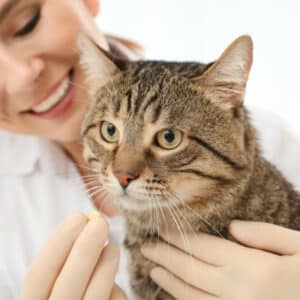
Giving a cat a dose of melatonin
How to Give Cats Melatonin
The importance of veterinary guidance in melatonin administration cannot be overstated. A veterinarian can provide a tailored dosage based on your cat’s specific needs, weight, and overall health status. They can also monitor your cat’s response to the treatment and make necessary adjustments. Regular check-ups are crucial, especially for long-term use, to ensure the ongoing safety and efficacy of the treatment.
When it comes to giving melatonin to your cat, the method depends on the form you’re using. For oral medications, hiding pills in treats or small amounts of food can be effective. Some cats may accept liquid forms mixed into their food or water, but it’s important to ensure the full dose is consumed. If these methods are unsuccessful, you may need to administer the medication directly into your cat’s mouth. This requires careful handling and may be stressful for some cats.
Subcutaneous implants are an alternative for cats that are difficult to medicate orally or for situations where consistent, long-term administration is needed. These implants are inserted by a veterinarian in a simple procedure and can provide melatonin supplementation for several months. They’re particularly useful for managing chronic conditions or for breeding control in cats.
Regardless of the form or method of administration, it’s crucial to follow your veterinarian’s instructions precisely. Consistency in timing and dosage is key to achieving the desired effects of melatonin supplementation in cats. Monitor your cat closely after starting melatonin treatment, observing for any changes in behavior, appetite, or overall well-being, and report any concerns to your veterinarian promptly.
As we’ve explored the potential benefits and considerations of melatonin for cats, it’s clear that this natural hormone can play a significant role in feline health.

Banixx Pet Care Spray for Cats
Banixx for Cat Lovers
At Banixx, we’re committed to providing you with comprehensive resources to keep your feline friend happy and healthy.
By staying informed and working closely with your veterinarian, you can make the best decisions for your cat’s health. Visit Banixx regularly for more expert advice on nurturing a thriving, contented feline companion.
Want info onhome remedies for cat ear infections? Orhow long to quarantine a cat with ringworm? Check more out on ourcat blogto see what else we’ve posted!
Sources
https://vcahospitals.com/know-your-pet/melatonin
https://vetmed.tamu.edu/news/pet-talk/sleeping-disorders-in-animals/
https://cats.com/melatonin-for-cats
https://www.pawcbd.com/blogs/posts/melatonin-for-cats-is-it-safe-why-how-and-when-to-use-it










